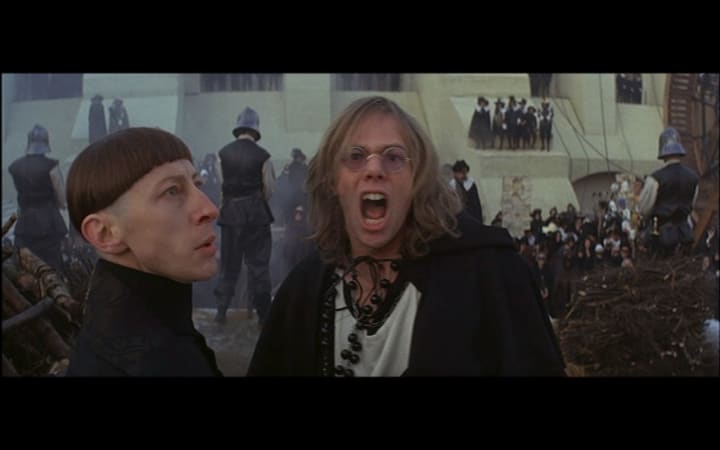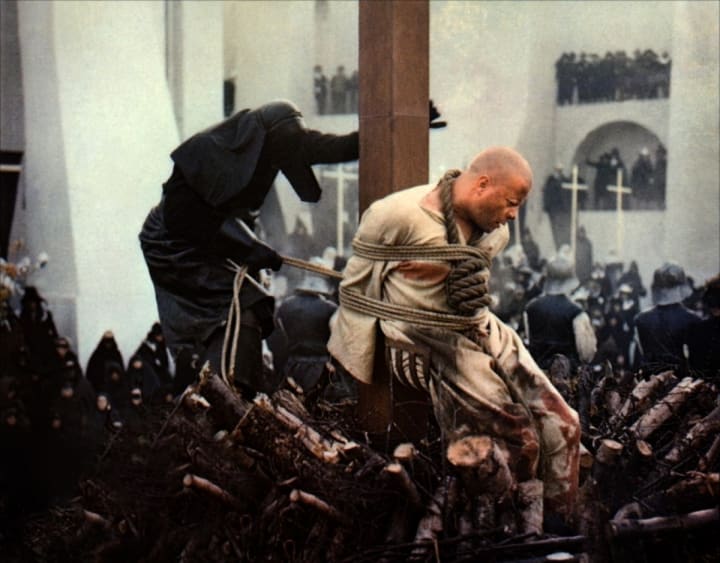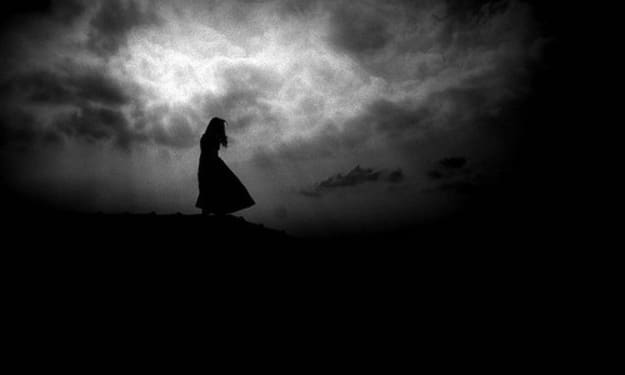
Modern life is horrible; one gets the feeling that a century back, whatever drawbacks those people might have faced, life was still infinitely better than the world we experience today, with its loud, abrasive music, school shootings, divorce, despair, disintegration, etc.
But, to watch the Ken Russell film The Devils (1971) might serve to prove you wrong. In point of fact, you'll be so damn happy you weren't born into the plague-pocked year of 1634, you'll swear modern times, far from being the dystopic nightmare most, secretly, perceive it to be, is veritably paradise-like, by comparison.
The film is an adaptation of Aldous Huxley's novel The Devils of Loudun (1952), the subject of which was the possession and exorcism of a convent of Ursuline sisters in seventeenth century France, and the resultant mass-hysteria which lead to the torture and execution of a priest with rather worldly, if not outright heretical views. In the film, the priest, Urbain Grandier, is played by the late Oliver Reed, a huge, imposing, bear-like man with a waxed moustache and blazing, eerie, cobalt-blue eyes. His demeanor, which alternates between bombast and a weirdly reserved, seemingly unflappable calm, seems to suggest a man trying to balance the best and worst aspects of his world; both spiritual and temporal, political, ecclesiastical, etc.
Grandier's character, a roving intellect that lives "like a Lord," is thrust against the walled backdrop of his city of Loudun, a 17th century state unto itself, wherein Protestants are barely tolerated, corpse carts carry plague victims to cremation in the town square (to predictable cries of "Bring out your dead!"), and mad, idiot doctors—really tragic-comic relief—perform torturous "cures" on dying victims that involve such stalwart healing practices as pressing live hornets against their skin whilst they lie upon a dead crocodile. Ah, the good old days!
Grandier, in between performing last rites at mass burials for plague victims, is compelled to butt heads against an adjutant ("Laubardemont," played by Dudley Sutton) of the wicked, so wicked (so very, very wicked) Cardinal Richelieu (Christopher Logue). Richelieu, it seems, has the ear of the (ahem) rather conspicuously "flamboyant" Louis the Thirteenth (Graham Armitage), insomuch as he wishes to combine church and state into one solid, quasi-fascistic personal fiefdom, or something. Loudun, with its walled city and its Protestant enclave ("May the Protestant be forever driven from our land," intones Richelieu at the beginning of the film, crossing himself), its pugnacious, rebellious, possibly fornicating priest Grandier, seems to stand in the way of that holy dream. Thus...
Grandier, seemingly sleeping with every ugly tramp in the ancient French demimonde, is shown cavorting nude with Phillipe (Georgina Hale), a girl of a too-white, pancaked complexion and an impressive forehead. Bit of a no-no for a Holy Father, we take it, but she stops practicing her Latin for a short period to inform him she is, indeed, pregnant (and not by Immaculate Conception, if we may be so bold).
This is one of the lynchpins, or plot points, upon which the rest of the film hinges. Grandier duels with the irate father of Phillipe (using, by the way, the aforementioned stuffed crocodile), and observes, per her father's disgust that, "Even lilies rot into decay." The world of The Devils, as a matter of fact, seems to firmly affirm this broad philosophical brushstroke.
Laubardemont plots and schemes to take Urbain Grandier out (to the burning stake), by manufacturing a demonic deception. To that end, the Ursuline sisters in the nearby convent come in handy, in particular the hunchbacked horror of "Sister Jeanne of the Angels" (played with excellent, flattened affect by Vanessa Redgrave), a being whose icy chuckles sound like the scraping of fractured infant bones against an old stone wall. Sister Jeanne, an icy-cold Bride of Christ, holds the leash enslaving her fellow nuns, ruling them with an iron, claw-like love that masks depths of psychological sadism and contempt few could probably fathom.
BUT, Sister Jeanne, poor thing, is tormented by Beelzebub, and Barquiel, and Asmodeus, and other incubi of lewd and shameful countenance; and, also, she has visions of Urbain Grandier crucified, coming off of the cross, crown of thorns and all, to make passionate love to her, in a Biblical world where her unfortunate deformity has disappeared.
Soon, her fellow nuns are stripping off their habits, revealing their flabby bodies and bald heads; reeling, grunting, rubbing themselves in orgiastic bacchanals against giant, weeping images of Christ, and even wearing old bondage collars that look as if they were purchased at a Hot Topic twenty years ago. 'Tis to laugh, choke, or puke.
A witness to all of these Black Mass, wicked-as-Hell rites of witchery, Father Mignon (Murray Melvin), an eerily effete proto-Cenobite who throws spit wads of distaste at Grandier and "his whores!," promptly, uh, "violates" himself in earnest shock, disgust, and titillation at all the unholy, flabby pale flesh on display. (And, also, possibly because he never considered that those oversized candles could quite be used in that manner.)
While all this is going on, Madeleine, a sort of mousy thing Grandier has married in a secret ceremony, decides to try and enter the devilish convent. She is soundly rebuffed by Sister Jeanne, who then proceeds to flagellate herself with a spiked metal whip, in between saying her rosary and driving a sharp crucifix into her bleeding palm. Penance, one supposes.
This "marriage" becomes another integral plot point. Laubardemont, having decided to, quite literally, burn Grandier's ass, brings in an exorcist cum witch hunter named Father Barre, played with pseudo-orgasmic, manic raving intensity by actor Michael Gothard (who would go on to commit suicide in 1992. Life imitating art, perhaps?), who mostly seems perched upon the edge of an apoplectic fit of madness. His religious mania borders on epileptic seizure frequently, but he does wear the same cool little gauntlets with the crosses on them that Richelieu also affects. Everyone is a Christly caricature, to be sure. It will be left up to the viewer to decide, of course, if any of this is, at bottom, based in relative truth.
The Devil You Know...

Father Mignon (Murray Melvin, left) and Father Barre (Michael Gothard) bring the shining light of holiness to a wasted pit of wanton wenches and naughty nuns in The Devils.
What follows then is an intense series of inquisitorial examinations, nuns writhing on the floor; crab-walking; growling; spitting; hanging from ropes; the naked debauchees, possessed and whipping around in a macabre burlesque show that attracts tourism, of a sort. A highly (highly, very highly) suspect "pact" with Satan is produced, implicating Grandier (who has already been fingered by Sister Jeanne; albeit after she is tortured by having some gallons of a noxious, milk-like fluid forced down her throat); he is the devil, incubi, possessing agent—or whatever the hell those people believed in 1634.
Cut to the chase. The bombastic Grandier, the proud peacock who held forth with "Enlightened" concepts about "freedom" and self-governance at the beginning of the film, is arrested, and then put on trial before a very frightening "Star Chamber" of Inquisitors in pointed KKK hoods, with crosses on the front; he, however, comports himself with severe gravitas, again, underscoring himself as the progressive, enlightened soul, overburdened with Truth and Reason, fighting the overwhelming and titanic force of superstitious ignorance, corruption—the madness of the age.
But, so much for all that. He is quickly sentenced to torture and death at the stake. But, not before he has carried a candle to the cathedral to do penance.
The Burning Times...

Hot in the City: Grandier (Oliver Reed), shorn of his handsome moustache and long, curly locks, preparing for a little impromptu barbecue in this climatic scene from The Devils.
The gloating Laubardemont, raiding Grandier's home, destroys his priceless artifacts and manuscripts, all the while informing him, in the most cold-blooded manner imaginable, that he is to be tortured and burned. (But, we take it, the man already knew this?)
Father Barre officiates at the "Extraordinary Question," commanding Grandier, in typical raving Old Testament fashion, to sign a confession, upon which Grandier refuses, confessing only that he is an innocent man. After this, Barre prays that Jesus will ma¡ke the torture all the more "excruciating," so that Grandier can find some absolution. We don't imagine that there was a tremendous lot of compassion to go around at such events in those august days.
Finally, we are lead out to the stake, the physically destroyed (and bald and clean-shaven) Urbain Grandier being carried out on a litter. Tied to the stake, the Executioner offers to mercifully strangle the doomed priest before the flames can touch him, but he is prevented in doing so by the vindictive and hate-filled Father Minon, who ignites the pyre and knots the noose before the man can even accomplish his grim design.
"Sorry priest!" the Executioner cries, leaping away from the wall of flames as they consume Grandier ALIVE (this actually occurred). Grandier, seen intermittently through a wall of fire, recalling William Wallace, delivers an impassioned final plea on behalf of men "fighting to remain free!" His blackened skin begins to resemble a hotdog cooked over an old-fashioned gas stove burner. Finally, only flames persist, and we see no more.
The riotous atmosphere of the assembled crowd, come out to watch the execution, is somewhere between public hanging and Mardi Gras. Phillipe (Georgina Hale), she of the too-pale skin and divine forehead, is seen on a balcony with her leering father, celebrating the hideous death of the hated Grandier (whom, you will remember, the father sparred with in the "Duel of the Stuffed Crocodile"), and both "laugh with sardonic wrath" (to quote a certain obscure Bible never confused with the more common one).
"It's not every day a bastard gets to see his father burned!" laughs Phillipe's father, holding up Phillipe and Grandier's love child so the infant can vide the barbecue.
Truly, this film The Devils is aptly titled.
At the moment of his death, the walls "come tumbling down"; or, rather, Laubardemont blows them, finally, securing the "imminent domain" of Holy Church, the power of Richelieu, and the dominance over the populace of Loudun.
The mousy, newly-widowed Madeleine wanders through the rubble of the wall, coming out to a road leading out of the city. On either side, long poles have been set up in the earth, going on into the distance. At the end of each, a rotting body is affixed to the Wheel, upon which these victims, these putative "wrongdoers" have been "broken." What were their respective crimes? Witchcraft? Consorting with the Devil? We do not know.
This final scene is like a woman emerging from a nightmare, with the nightmare still surrounding her waking mind as she comes up from layers of dreadful slumber.
During the course of this film, we are treated to scenes harsh and brutal: a procession of slaves being whipped ("Hurry it up, you Protestant bastards!"); men walking in giant hamster wheels; Grandier having his legs broken with wooden wedges and a hammer; stinging hornets; mad, nude, demonic revels; executions; rotting corpses; decay—blood, blood, and more blood. The world of The Devils is one in which death and torture are the common currency, traded in, to barter for human souls, in a mad world in which devotion to piety is seen as the only and ultimately worthy goal of a joyless, tragic and bleak existence. Some might argue there is, fundamentally, little different between this old world, and our new, modern, "enlightened" time, except that we hide our sadism under a guise of moral righteousness and scientific reason. The killing is still the same, the death doled out, every day, day in and day out, all across the world.
Watching The Devils is a little like drinking a glass of very bitter gall. Mixed with a few dead insects. Perhaps some ashes. Not pleasant in any imaginable way, shape, or form, The Devils is intensely harsh and brutal, bleak; the proverbial "assault on the senses."
Yet, for all that, it's an experience you wont soon forget. After all, the Devil you know is always preferable.
About the Creator
Tom Baker
Author of Haunted Indianapolis, Indiana Ghost Folklore, Midwest Maniacs, Midwest UFOs and Beyond, Scary Urban Legends, 50 Famous Fables and Folk Tales, and Notorious Crimes of the Upper Midwest.: http://tombakerbooks.weebly.com






Comments
There are no comments for this story
Be the first to respond and start the conversation.